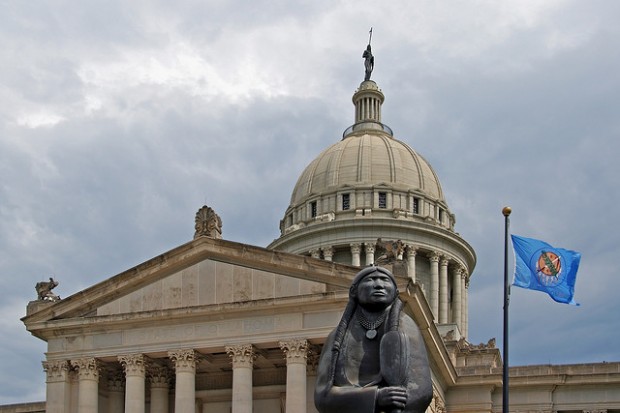The Legacy and Challenges of a State Question That Shapes Bills Decades Later
-
Joe Wertz
When the 2014 legislative session starts Feb. 3, state lawmakers will face more than 2,000 bills and resolutions, and are expected to have $170 million less to spend than last year. They will also be confronted by agency heads, most of which will argue, publicly, for more money.
Many of the bills under consideration this year address revenue and spending, directly. Republican measures to cut the income tax, for example, or gross production taxes on oil and gas activity the energy industry would like to reduce.
But all the budget meetings and bills — from pension reform to bonds for storm shelter construction at public schools — are affected by government funding, and will be shaped by a single state question Oklahoma voters made into law more than 20 years ago.
Born from Bust
Oklahoma government seems like it’s designed to wither on the vine. For the last two decades, it’s been nearly impossible to raise state taxes in Oklahoma.
“You need to have a super-majority in the house and the senate, and the governor has to sign it,” says Alexander Holmes, a Regent’s Professor of Economics at the University of Oklahoma, where he chairs the Economics Department. “You have to have all three parties in order to increase taxes.”
Oklahoma voters in 1992 approved State Question 640, a measure that forced any tax increase to go before a vote of the people if it doesn’t win a three-fourths vote in both houses of the legislature.
“In Oklahoma, I’m still betting that if you reduce the taxes you can never make them go up again,” Holmes says.
Holmes knows a lot about State Question 640 because he was at the Capitol when the effort was born. From 1987 to 1991, he was the state budget director and Gov. Henry Bellmon’s Secretary of Finance and Revenue. Holmes says oil busts in the 1980s spurred a double-dip recession that forced Bellmon and lawmakers to raise taxes to fill state budget gaps. At the same time, Bellmon was pushing for a $230 million school reform package that was passed through an emergency clause, which prompted outcry from opponents who wanted a statewide vote.
“It was a bloody, brutal battle,” Holmes says.
Backers of State Question 640 soundly outspent their rivals, and Oklahoma voters approved the measure by a 56 percent majority.
Limit Not Limiting
Now, 23 years later, Preston Doerflinger has Holmes’ old job.
“As far as 640 goes, it just doesn’t enter into the equation,” says Doerflinger, who serves as Gov. Mary Fallin’s Secretary of Finance and Revenue and director of the Office of Management and Enterprise Services.
Doerflinger isn’t worried about the tax revenue limitation. He says Oklahomans wouldn’t want to raise taxes even if it were easier, politically.
“If anything, I think you’ll see continue to see moves to reduce taxes,” he says. “Whether that be through income tax, franchise tax, there are other places that I think the citizens of this state would rather see their tax burdens decreased.”
Oklahoma’s Senate leader, President Pro Tempore Brian Bingman, agrees. One of the few things Oklahoma lawmakers are required to do is pass a balanced budget, and Bingman says the permanency State Question 640 presents is in the back of lawmakers’ minds when they push for tax cuts.
“That’s why I think we’re very cautious when we look at reducing the taxes in Oklahoma,” says Bingman, R-Sapulpa. “It would very difficult to raise those taxes.”
But Holmes, the economist, says a lot of the tax cut talk coming from Oklahoma’s Capitol is driven by political public relations — not economic policy.
“I don’t want to impugn anybody’s motives,” Holmes says. “My suspicion is, however, that a lot of these tax reductions are driven simply because they want government to go away. Or at least shrink.”
Holmes says it’s easy to talk tax cuts when things are good economically. An oil and gas boom helped the state weather the recent recession, and the energy sector is largely responsible for Oklahoma having one of the lowest unemployment rates in the country.
But Holmes worries that constant tax cuts — and the challenge State Question 640 poses in raising them — hurts the state’s financial flexibility. At least one credit rating agency, Moody’s, echoes that sentiment.
Holmes says these factors could combine to create a major crisis if Oklahoma’s economy tanks from, say, another oil bust like the one the state suffered in the 1980s.


